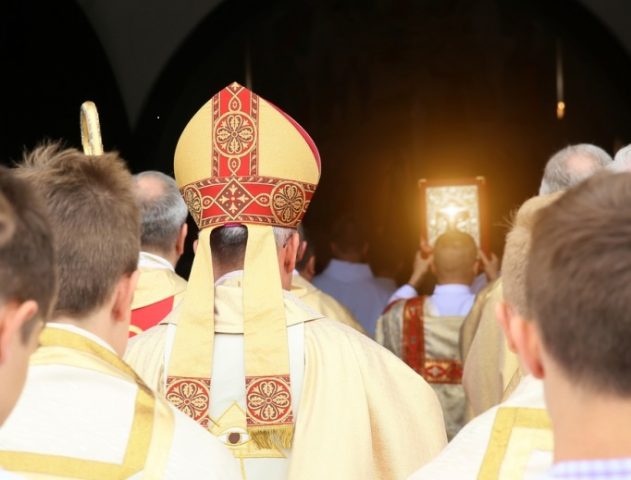How Individual Bishops Can Reform The Church Right Now, by Tim Busch

The Stay-At-Home Mom Wars and the Altar of GDP
May 15, 2019
Daily Reading & Meditation: Thursday (May 16)
May 16, 2019
COMMENTARY: For the sake of their flocks, they should take action immediately.
By Tim Busch, NAPA Institute Founder
When it comes to Church reform related to the clergy sexual-abuse crisis, faithful Catholics are still waiting for concrete action.
Two months ago, the Vatican held its first-ever summit on the sexual abuse of minors, where Pope Francis called on bishops to end the scourge of abuse in their dioceses. Two months from now, the U.S. Conference of Catholic Bishops will hold its annual summer assembly. There, bishops are expected to enact new measures to protect children and promote accountability and healing, although specific proposals have yet to be made public. The U.S. bishops’ fall assembly last November yielded no reform after Pope Francis asked the bishops to delay votes on any proposals until after the February summit.
Yet our shepherds don’t need to wait for June: Individual bishops can enact real, meaningful reforms immediately. They don’t need approval from the U.S. Conference of Catholic Bishops (USCCB) or even the Vatican to begin to make changes. They just need the courage to act.
Recently, Baltimore Archbishop William Lori exemplified a path forward. He specifically focused on filling in the gaps in the 2002 Dallas Charter.
That document, released in the wake of the Boston sexual-abuse scandal, established new policies to prevent abuse of children by priests and deacons — but it omitted any reference to handling allegations of abuse by bishops nor did it address covering up abuse. This omission is important because bishops may be sexual abusers themselves or perpetuate cover-ups. The recent revelations about Theodore McCarrick and the Pennsylvania grand jury report make this clear.
Archbishop Lori pushed to right this wrong by making bishops accountable, too. The archdiocese enacted new measures last November that included bishops under its Dallas Charter policies. The archbishop also directed the archdiocese’s Independent Review Board to develop a system to address allegations against Baltimore’s bishops — past, present and future. The board, which is composed primarily of lay Catholics, instituted this new system in January of this year.
These new policies are far-reaching. The Archdiocese of Baltimore now investigates all allegations of sexual abuse by bishops — whether against minors or adults. It also investigates allegations against bishops involving negligence and cover-ups of other abusers. In a matter of months, Archbishop Lori filled in the Dallas Charter’s most glaring deficiencies.
These actions are unprecedented. They are the first of their kind in the American Church — and Baltimore isn’t the only place they’ve taken root.
While normally an archbishop could only institute such policies in his own diocese, Archbishop Lori was recently appointed by the Vatican as apostolic administrator of the Diocese of Wheeling-Charleston. This gave him the power to copy Baltimore’s measures there. Already, Archbishop Lori, with the Vatican’s approval, has prohibited the former bishop of Wheeling-Charleston, retired West Virginia Bishop Michael Bransfield, from exercising any priestly ministry in his former diocese or the Archdiocese of Baltimore. The archbishop also announced similar restrictions against a retired auxiliary bishop in Baltimore, Bishop Gordon Bennett.
Already at least one other bishop has followed suit in reform. In March, Cardinal Seàn O’Malley took similar action to hold bishops accountable in the Archdiocese of Boston. Both Archbishop Lori and Cardinal O’Malley should be thanked for these steps in enhancing the accountability of our shepherds.
To be clear: Beyond these policies, other bishops have taken important action. Cardinal Timothy Dolan investigated Theodore McCarrick, having been encouraged by the Vatican to do so. Over the past year, Cardinal Dolan and Archbishop José Gomez in Los Angeles also worked with the Vatican to remove auxiliary bishops credibly accused of abusing minors.
Bishops are cleaning up their dioceses with a speed we haven’t seen in my lifetime, if ever. Implementing the policies pioneered by Archbishop Lori is the next step.
So far, such policies cover only a few of America’s 196 archdiocese and dioceses. The rest could easily and swiftly follow — if their bishops want it and demand it. Such changes don’t need the USCCB assembly’s approval. If bishops get the ball rolling now in their own dioceses, they could already have new and stronger reporting protocols established within just a few months. For the sake of their flocks, they should take action immediately. Such action on the part of individual bishops will certainly demonstrate just how determined they are for reform.
Of course, none of this precludes action the U.S. bishops must take collectively at the USCCB meeting in June. As I’ve written before, the bishops still need to update the Dallas Charter to promote accountability in dioceses nationwide.
Specifically, they should empower the lay review boards in every diocese to investigate all allegations against bishops as well as priests and deacons who violate their vows of chastity. These reforms would provide an extra layer of protection for children and give the lay faithful confidence that the bishops are serious about cleaning up the Church. They would also give the laity a greater role in the purification and healing of our Church, in line with the Second Vatican Council’s call for greater lay involvement.
The responsibility to act lies with each bishop and all bishops. They can act independently in their own dioceses and they can act together through the USCCB — ideally both. The worst thing they could do is not act at all. Faithful Catholics have already waited too long for Church reform.
Tim Busch is founder of the Napa Institute, a Catholic lay apostolate that advocates Church reform.
http://napa-institute.org/2019/04/24/how-individual-bishops-can-reform-the-church-right-now/




